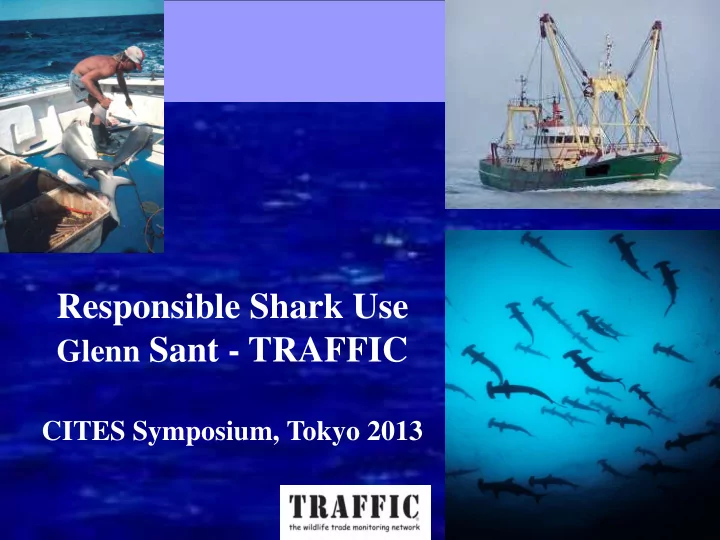

Responsible Shark Use Glenn Sant - TRAFFIC CITES Symposium, Tokyo 2013
Top 20 shark catchers, 2002-2011 (total capture, tonnes, of all sharks, skates, rays and chimaeras included in FAO Fishstat) • Map from report
Top 10 fresh and frozen shark meat exporters and importers, total tonnes traded 2000-2009 (FAO Fishstat) Exporter tonnes Importer tonnes 1 Spain 123 848 1 Spain 144 697 2 Taiwan 103 067 2 Italy 111 238 3 Panama 46 543 3 Brazil 98 668 4 Uruguay 44 653 4 Mexico 65 628 5 Costa Rica 43 252 5 Uruguay 61 273 6 United States of 38 521 6 China 50 005 America 7 France 35 286 7 Japan 35 199 8 Republic of Korea 31 913 8 Canada 33 596 9 Nigeria 22 474 9 United Kingdom 26 860 10 Singapore 21 836 10 New Zealand 21 496
Top 10 shark fin exporters and importers, total tonnes traded 2000-2009 (FAO Fishstat) Exporters tonnes Importers tonnes 1 Thailand 23 220 1 Hong Kong 105 549 2 China 13 544 2 China 31 228 3 Indonesia 10 762 3 Singapore 12 337 4 Singapore 9 737 4 Malaysia 6 896 5 Taiwan 6 378 5 Indonesia 1 582 6 United Arab Emirates 4 765 6 Taiwan 1 205 7 Malaysia 2 124 7 Thailand 1 198 8 Japan 1 978 8 Macao 1 136 9 United States of 1 941 9 United States of 334 America America 10 Yemen 1 753 10 Canada 328
Sharks in general more vulnerable to overexploitation than other fish: • Few young • Long lived • Late to mature • Caught as secondary species to managed fish such as tuna, but lack shark-specific management • Shared stocks with little or no management
Responsible Management & Trade: Who is Responsible? • National (National Plans of Action) • Regional (RFMOs) • Global (FAO International Plan Of Action, CITES)
Considerations for issuing CITES permits: • NDF – Non-detriment finding (sustainability) • Legal Finding (eliminating IUU) • Introduction From The Sea (high seas)
CITES Implementation issues to resolve by September 2014: • NDF on shared stocks • Account for all mortality (discarded non-target dead sharks) • Traceability (Shark Track) • Government capacity • Identification of species and shark products
CITES complementing National/Regional Management: CITES Regional (RFMOs) 178 Parties Much less coverage across catching/trading countries Traceability of products (source-to- Few specific traceability measures market) for sharks Species specific NDF (sustainability Mostly general, if any, requirement) management ( e.g. shark fin bans under WCPFC) Specific action against non- Few consequences for non- compliance by CITES Parties – e.g. compliance trade sanctions Species-specific requirements Limited to geographic area of range wide, including on high seas RFMO
* CITES listings do not take away the need for comprehensive fisheries management. * CITES represents one critical management component to prevent international trade in CITES-listed species being sourced from unsustainable or illegal fisheries.
Responsible Shark Use Glenn Sant - TRAFFIC CITES Symposium, Tokyo 2013
Recommend
More recommend